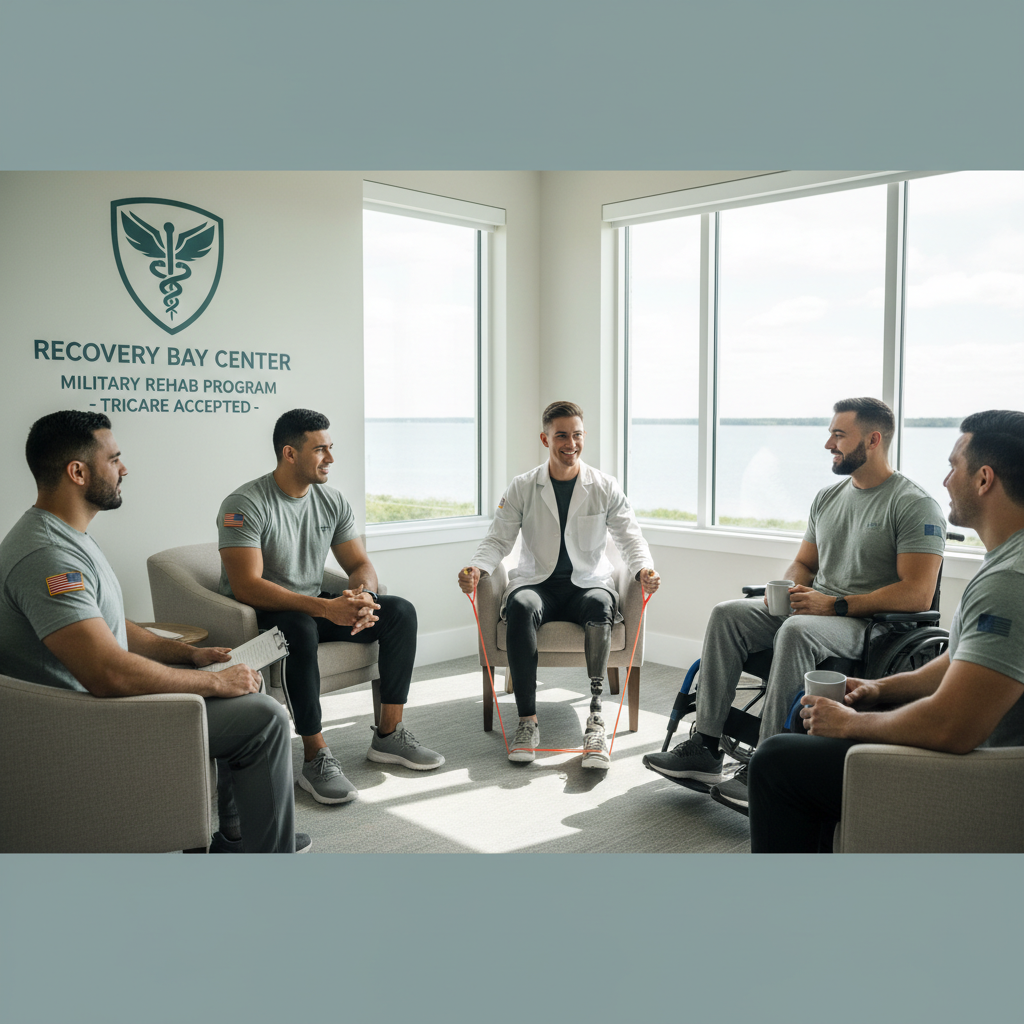You might find that a beach therapy rehab setting can significantly enhance every aspect of your recovery journey. From the soothing sounds of the ocean to the natural sunlight and fresh air, this tranquil environment offers more than just a scenic backdrop. If you or a loved one needs men’s drug and alcohol detox and rehab services, a beach-centered approach may be exactly what you’re looking for. At Recovery Bay Center, we blend evidence-based therapies with the healing power of the shoreline, ensuring you’re supported every step of the way in a safe, welcoming setting.
By focusing on men’s recovery needs in particular, we address factors such as social pressures, emotional suppression, and the stigma that often surrounds male vulnerability. Overall, the beach environment can help you find renewed motivation, a greater sense of connection, and a structured approach to healing. Below, you’ll learn why spending time by the sea can create a deeply transformative path to wellness, alongside targeted support services that cater to your specific needs.
Experience a beach therapy rehab setting
A beach therapy rehab setting is designed to utilize the natural healing elements of coastal environments to serve as a foundation for lasting sobriety. This type of environment capitalizes on the gentle yet powerful influence of sun, sand, and sea. For many individuals, simply being in a calming, natural setting reduces stress, enhances brain function, and bolsters a sense of optimism about the recovery process.
How nature supports healing
Men often grapple with unique stressors such as workplace demands, family responsibilities, and societal expectations around self-reliance. These pressures can lead to unspoken anxieties or a tendency to suppress emotions. Being near the ocean can provide a refreshing pause from these pressures, allowing you to:
- Relax the mind and body by walking along the shoreline. Research has shown that spending just 20 minutes on the beach can boost your mood (WebMD).
- Reflect on personal challenges in an environment that feels safe and supportive.
- Engage in gentle exercise like beachcombing or wading in the water, encouraging physical activity without harsh impact on your joints.
- Benefit from negative ions in the sea air, which have been linked to improved mood and a reduction in stress (PTSD UK).
This approach not only fosters calmness but also offers an effective framework for tackling the deeper issues that drive addiction. Feeling at peace in your surroundings can make it easier to address personal challenges, attend counseling sessions, and develop new coping mechanisms specific to men’s experiences.
Empowerment through thalassotherapy
Thalassotherapy is an alternative treatment that taps into the healing properties of seawater and marine elements. Studies have shown that thalassotherapy can assist with various conditions, including musculoskeletal disorders (Medical News Today). For instance, bathing in the ocean, participating in aquatic exercises, or engaging in hydromassage can:
- Help you manage pain or tension by relieving stress on the muscles.
- Promote better circulation, which supports both physical and mental well-being.
- Provide a uniquely soothing experience that encourages deeper relaxation.
When you’re seeking out addiction treatment, it’s crucial to find therapies that feel engaging and relevant. Thalassotherapy, integrated into traditional methods like group or individual counseling, can offer a welcome blend of physical rejuvenation and mental clarity tailored to men’s challenges.
Recognize the core benefits
A well-rounded beach therapy rehab setting doesn’t stop at providing you with a scenic location. It leverages numerous clinically recognized benefits that can actively support or even accelerate your progress in recovery. These advantages often go beyond what you might find in a standard clinical setting, making beach therapy a compelling option if you’re looking to break free from substance use.
Restoring mental balance
Men sometimes resist discussing emotional or mental health struggles because of cultural norms around stoicism. The beach, however, naturally encourages you to unwind and open up emotionally. According to studies, simply being in a coastal environment helps lower levels of the stress hormone cortisol, promoting relaxation (WebMD). This drop in stress levels enables you to:
- Focus more readily on therapy sessions.
- Develop emotional resilience against potential triggers.
- Experience increased motivation to continue your sobriety journey.
If you’ve been hesitating to seek help for fear of vulnerability, remember that the soft backdrop of waves, sunlight, and fresh air can create a sense of safety and offer that extra nudge to share openly.
Improving physical health
Detoxing from drugs or alcohol can take a toll on your body. Incorporating beach and water exercises provides multiple perks that tie directly into men’s rehab goals. Buoyancy in water reduces strain on your joints, while natural sand resistance increases the effectiveness of exercise. This supportive environment helps you:
- Rebuild muscle strength and flexibility.
- Enhance cardiovascular fitness with minimal joint impact.
- Increase endurance and improve sleep patterns.
Recovery is about more than mental clarity. It encompasses a full-body return to health. Exercising on the beach can offer a refreshing alternative to indoor settings, keeping you motivated as you work toward a new daily routine.
Enhancing emotional well-being
Men generally benefit from stress management strategies that allow space for self-expression. Beach therapy helps you achieve that sense of relief by:
- Encouraging thoughtful introspection by the shore.
- Offering activities that reduce feelings of isolation, such as surfing or beachcombing in small groups.
- Promoting gradual openness through shared experiences in group therapy sessions on the sand.
With opportunities to connect socially while retaining individual privacy and comfort, you can tackle self-consciousness and learn to process vulnerable emotions in a healthier way. Men are also more likely to experience significant mental health improvements at the beach compared to women, according to one study (WebMD).
Discover specialized men’s recovery
Recovery Bay Center emphasizes a men-specific approach to rehab that merges seamlessly with the restorative qualities of a beach environment. We recognize challenges like masculinity norms and societal expectations, so we design programs that directly address these hurdles. By placing you in a setting that encourages reflection and growth, we lay out a path that’s uniquely tailored to your experience.
Combining structured care with natural elements
Structure stands at the cornerstone of successful addiction recovery (Recovery Beach). At Recovery Bay Center, you can expect a careful balance of therapeutic activities, free time, and peer support. Beach therapy adds a new dimension to that structure by:
- Providing an open-air space for guided group therapy or holistic therapy.
- Offering daily walks that encourage mindfulness, reduce stress, and boost emotional regulation.
- Creating a schedule that alternates between indoor sessions and outdoor experiences, ensuring you avoid stagnation or frustration.
This combination helps maintain steady progress, while the natural setting reduces mental fatigue and builds motivation. You’ll find that each day follows a rhythm that feels purpose-driven, yet flexible enough to accommodate personal healing styles.
Addressing men’s emotional needs
Societal expectations can foster a sense of shame or isolation for men coping with addiction. In a beach therapy rehab setting, it’s easier to release these burdens. The environment exudes warmth and acceptance, supporting an atmosphere where expressing vulnerability becomes more natural. This can be especially helpful if you’re struggling with related mental health concerns. By merging men’s mental health counseling with the calming power of the sea, you might find:
- Greater willingness to open up about personal uncertainties and triggers.
- Improved trust in therapists and peers, leading to stronger therapeutic alliances.
- A more cohesive sense of shared experiences with other men in recovery, boosting camaraderie and self-esteem.
A men-specific approach recognizes that your emotional responses to stress or trauma might differ from what women experience, ensuring that the therapeutic process remains relevant and impactful.
Incorporating holistic and clinical therapies
At Recovery Bay Center, we blend time-tested clinical interventions with the restorative power of nature. For instance, you could join a morning meditation by the shore, followed by an afternoon individual therapy session that focuses on your personal history:
- Yoga and meditation on the sand: Cultivates mindfulness, promoting greater mental clarity.
- Trauma informed therapy in a calming seaside space: Helps reduce anxiety while processing difficult memories.
- Specialized psychiatric support therapy: Ensures that any underlying mental health conditions receive professional, confidential attention.
These options allow you to address all dimensions of addiction recovery, from physical health and emotional well-being to social bonds and long-term relapse prevention. By accessing a range of therapies, you reinforce your resolve to overcome the unique challenges tied to men’s substance use disorders.
Learn how therapy merges care
Beach therapy doesn’t stand alone. Rather, it integrates seamlessly with various other therapeutic modalities, creating a unified approach that addresses all facets of addiction. The value lies in its flexibility: whether you need immediate intervention for substance use or a supportive environment for ongoing recovery, coastal settings complement the core treatments you’ll receive.
Aligning with standard rehab methods
A typical day in rehab involves a set of activities aimed at optimizing your progress. You might begin the day with sunrise reflections, then continue with:
- Medical check-ins for detox support, ensuring safe, guided withdrawal.
- Structured outdoor fitness sessions on the beach for a balanced physical routine.
- Counseling circles that allow you to practice vulnerability in a supportive group of men.
- One-on-one meetings to refine your structured recovery plan and map out your goals.
In such a system, beach therapy enhances each element by reducing stress, lifting energy levels, and encouraging consistent attendance. You may feel more receptive to advice and more agile in adopting healthier habits if your body and mind are already in a relaxed state.
Building self-awareness
Gaining deeper insight into your triggers and emotional patterns is an essential part of recovery. The beach can serve as a living metaphor, reminding you that life has its ebbs and flows, just like the tides. Being outdoors typically increases mindfulness, giving you space to:
- Reflect on past behaviors without constant mental clutter.
- Recognize personal strengths, such as resilience or determination, that you can channel into sobriety.
- Embrace growth as a continual process, with each wave symbolizing both challenges and the potential for renewal.
Alongside nature’s lessons, professional guidance helps you integrate your new self-awareness into daily practices. This might include journaling after a walk on the sand or discussing your breakthroughs with a counselor later in the day.
Nurturing sustainable engagement
In many rehab programs, relapse prevention plans can feel abstract or intimidating. Beach therapy, however, encourages you to see how small, enjoyable actions—like taking a short stroll on the shore or focusing on the horizon—can have a major impact on maintaining calm and focus. This fosters confidence in your ability to manage potential stressors and triggers when you return home.
If you have a history of relapsing after traditional treatment, adding a beach-based dimension might rekindle your commitment. The memory of the tranquil environment often serves as a powerful motivator when facing everyday challenges. Additionally, many men take comfort in continuing to visit nearby beaches or natural areas once they’ve completed treatment, using the skills they learned in rehab to renew a sense of stability.
Review frequently asked questions
Below are some frequently asked questions about the beach therapy rehab setting, focusing on the unique needs of men seeking recovery.
1. What exactly is a beach therapy rehab setting?
A beach therapy rehab setting is a recovery environment located near or directly on the coast, where the soothing elements of the sea, sand, and sunlight are central to the healing process. This approach integrates natural surroundings with clinical support, creating an atmosphere that promotes relaxation, reflection, and motivation to change.
2. Does a beach therapy program address men’s specific needs?
Yes. Men face unique societal pressures and may experience emotional suppression or added stigma around seeking help. Beach therapy often eases these barriers by fostering openness and vulnerability in an inviting setting. Facilities like Recovery Bay Center offer men’s-only services that respect the nuances of a male-focused approach, from group activities to structured counseling sessions.
3. Can beach therapy be combined with traditional rehab methods?
Absolutely. In fact, a beach setting often augments traditional approaches. Whether you’re participating in family therapy, dual diagnosis therapy, or individual therapy, conducting sessions in a restorative beach environment can help reduce stress, calm anxieties, and encourage more consistent attendance and engagement.
4. Is beach therapy suitable for all stages of recovery?
Yes. Whether you are in the early stages of detox or transitioning to aftercare, beach therapy’s calming influence can boost confidence, reduce negative thought patterns, and streamline skill-building. Most facilities tailor their programs to accommodate varying recovery phases, ensuring that you receive the right level of support at each milestone.
5. How does this environment help prevent relapse?
Beach therapy promotes mindfulness, which can significantly reduce relapse risks. Activities like walking, yoga, or reflective journaling by the water help you develop coping strategies for stress and emotional triggers. Plus, the positive associations you form with the beach during treatment can be a powerful tool to lean on once formal rehab ends.
Embrace a renewed direction
When you envision your recovery journey, picture an environment that feels welcoming and cathartic—a place where you can relax, learn, and experience subtle transformations each day. A beach therapy rehab setting, especially one focusing on men’s challenges, can offer that and more. The natural restorative properties of the shoreline amplify the benefits of medically guided detox, professional counseling, and peer support.
At Recovery Bay Center, you’ll discover a blend of compassionate care, structured routines, and an inspiring environment. This integrated approach recognizes that men deserve a space where their specific struggles are taken seriously, and where therapy feels motivating rather than intimidating. By incorporating options like structured mental health support, holistic therapy, and outdoor fitness programs, we cater to diverse needs while harnessing the therapeutic qualities of sun, sand, and surf.
Remember that your decision to seek help is already a major step. Choosing a men-only rehab that leverages the power of the beach sets the stage for deeper emotional breakthroughs and more sustainable sobriety. In this setting, you’re not just going through the motions of treatment—you’re actively rejuvenating your body, mind, and spirit. The ocean’s rhythmic tide, warm sand underfoot, and fresh air all contribute to an enriched perspective on life, guiding you toward the confidence and resilience you need to remain substance-free.
Ultimately, if you’re looking for a place to redefine your future away from addiction, consider embracing the healing potential of a beach therapy rehab setting. Men who harness the tranquility of coastal landscapes often find it easier to explore their motivations, confront their fears, and adopt healthier coping mechanisms—transformations that are vital for lasting recovery. Whether you’ve tried treatment before or are new to the process, the calming waves and supportive community can help you rediscover a hopeful path forward. With the right combination of expert care and nature’s gentle encouragement, you can truly embark upon a renewed direction in life, free from the constraints of addiction.





